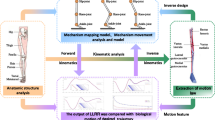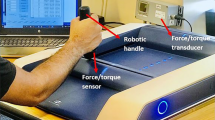Abstract
In this paper, the problem of non parametric uncertainty in the active training stage of stroke patients is discussed. On the basis of the nonlinear iterative learning theory, a double iterative compensation learning control is proposed. This method adopts the strategy of double loop iteration which can adjust controller parameters in real time to satisfy the patients’ condition. First, a class of saturated nonlinear functions is introduced to satisfy the requirement of position constraints. Then, reference trajectory self-modified strategy is designed for the initial positioning error. Meanwhile, the iterative compensation controller is designed according to the active torque of the patient, which can provide appropriate power compensation to the affected limb and update the parameters of the iterative learning controller continuously. At last, the convergence condition and its proof are given. The simulation results show the effectiveness and practicability of the proposed double iterative compensation optimal control strategy.
Similar content being viewed by others
References
F. Yan, F. L. Tian, and Z. K. Shi, “Iterative learning control approach for signaling split in urban traffic networks with macroscopic fundamental diagrams,” Mathematical Problems in Engineering, vol. 7, no. 2, pp. 1–12, July 2015.
M. Uchiyama, “Formation of high-speed motion pattern of a mechanical arm by trial,” Transactions of the Society of Instrumentation & Control Engineers, vol. 14, no. 6, pp. 706–712, June 1978.
S. Arimoto, S. Kawamura, and F. Miyazaki, “Bettering operation of robots by learning,” Journal of Robotic Systems, vol. 1, no. 2, pp. 123–140, January 2010.
D. Meng, Y. Jia, and J. Du, “H∞ approach to monotonically convergent ILC for uncertain time-varying delay systems,” International Journal of Systems Science, vol. 46, no. 2, pp. 209–217, January 2015. [click]
F. Bouakrif, “Iterative learning control for MIMO nonlinear systems with arbitrary relative degree and no states measurement,” Complexity, vol. 19, no. 1, pp. 37–45, September 2013. [click]
R. Zhang, Z. Hou, and R. Chi, “Adaptive iterative learning control for nonlinearly parameterised systems with unknown time-varying delays and input saturations,” International Journal of Control, vol. 88, no. 6, pp. 1133–1141, June 2015.
X. H. Bu, Z. S. Hou, S. T. Jin, and R. H. Chi, “An iterative learning control design approach for networked control systems with data dropouts,” International Journal of Robust & Nonlinear Control, vol. 26, no. 1, pp. 91–109, January 2016. [click]
X. Li, D. Huang, and B. Chu, “Robust iterative learning control for systems with norm-bounded uncertainties,” International Journal of Robust & Nonlinear Control, vol. 26, no. 4, pp. 697–718, March 2016. [click]
T. Chen, X. Tian, and Y. Li, “Intelligent dimensional error pre-compensation in CNC grinding using iterative learning approach,” The International Journal of Advanced Manufacturing Technology, vol. 67, no. 5, pp. 1825–1832, July 2013.
F. Bouakrif, D. Boukhetala, and F. Boudjema, “Velocity observer-based iterative learning control for robot manipulators,” International Journal of Systems Science, vol. 44, no. 2, pp. 214–222, February 2013. [click]
S. K. Wang, J. Z. Wang, and J. B. Zhao, “Application of PD-type iterative learning control in hydraulically driven 6-DOF parallel platform,” Transactions of the Institute of Measurement and Control, vol. 35, no. 5, pp. 683–691, July 2013.
X. Ruan and Z. Z. Bien, “Pulse compensation for PD-type iterative learning control against initial state shift,” International Journal of Systems Science, vol. 43, no. 11, pp. 2172–2184, November 2012. [click]
F. M. Chen, J. S. H. Tsai, and Y. T. Liao, “An improvement on the transient response of tracking for the sampled-data system based on an improved PD-type iterative learning control,” Journal of the Franklin Institute, vol. 351, no. 2, pp. 1130–1150, February 2014.
X. Ruan and Z. Li, “Convergence characteristics of PDtype iterative learning control in discrete frequency domain,” Journal of Process Control, vol. 24, no. 12, pp. 86–94, December 2014.
H. Wang, J. Dong, and Y. Wang, “High-order feedback iterative learning control algorithm with forgetting factor,” Mathematical Problems in Engineering, vol. 10, no. 3, pp. 1–7, October 2015.
S. Arimoto, “Learning control theory for robotic motion,” International Journal of Adaptive Control & Signal Processing, vol. 4, no. 6, pp. 543–564, November 1990. [click]
J. Y. Choi and J. S. Lee, “Adaptive iterative learning control of uncertain robotic systems,” International Journal of Control, vol. 147, no. 5, pp. 217–223, May 1996.
Y. Liu and Y. Jia, “An iterative learning approach to formation control of multi-agent systems,” Systems & Control Letters, vol. 61, no. 1, pp. 148–154, January 2012. [click]
D. A. Bristow, M. Tharayil, and A. G. Alleyne, “A survey of iterative learning control,” IEEE Control Systems, vol. 26, no.3, pp. 96–114, June 2006. [click]
T. Hu, S. Wang, and H. Zhou, “Theoretical insights on contraction-type iterative learning control for biorobotic systems with preisach hysteresis,” International Journal of Advanced Robotic Systems, vol. 13, no. 3, pp. 1–8, June 2016.
P. Sampson, C. Freeman, and S. Coote, “Using functional electrical stimulation mediated by iterative learning control and robotics to improve arm movement for people with multiple sclerosis,” IEEE Transactions on Neural Systems & Rehabilitation Engineering A Publication of the IEEE Engineering in Medicine & Biology Society, vol. 24, no. 2, pp. 235–248, February 2016.
C. Yu, “Trajectory tracking of wheeled mobile robot by adopting iterative learning control with predictive, current, and past learning items,” Robotica, vol. 33, no. 7, pp. 1393–1414, April 2015. [click]
J. M. Li, Y. P. Sun, and T. Liu, “Hybrid adaptive iterative learning control of non-uniform trajectory tracking,” Control Theory & Applications, vol. 25, no. 1, pp. 100–104, January 2008.
C. J. Chien, “Fuzzy system-based adaptive iterative learning control for nonlinear plants with initial state errors,” IEEE Transactions on Fuzzy Systems, vol. 12, no. 5, pp. 724–732, October 2004. [click]
Q. Z. Yan and M. X. Sun, “Error trajectory tracking by robust learning control for nonlinear systems,” Control Theory & Applications, vol. 30, no. 1, pp. 23–30, January 2013.
X. S. Dai and S. P. Tian, “Iterative learning control for first order strong hyperbolic distributed parameter systems,” Control Theory & Applications, vol. 29, no. 8, pp. 1086–1089, August 2012.
S. Liu and J. Liu, “Extended Laguerre basis function based iterative learning control for non-minimum phase systems,” Control Theory & Applications, vol. 29, no. 8, pp. 985–992, August 2012.
J. X. Xu and X. Jin, “State-constrained iterative learning control for a class of MIMO systems,” IEEE Transactions on Automatic Control, vol. 58, no. 5, pp. 1322–1327, May 2013. [click]
X. Jin, Z. Wang, and R. H. S. Kwong, “Convex optimization based iterative learning control for iteration-varying systems under output constraints,” Proc. of IEEE International Conference on Control & Automation, pp. 1444–1448, June 2014. [click]
K. P. Tee, S. S. Ge, and E. H. Tay, “Adaptive control of a class of uncertain electrostatic microactuators,” Proc. of American Control Conference, New York, NY, USA, pp. 3186–3191, July 2007.
B. Niu and J. Zhao, “Barrier Lyapunov functions for the output tracking control of constrained nonlinear switched systems,” Systems & Control Letters, vol. 62, no. 10, pp. 963–971, October 2013.
K. P. Tee, S. S. Ge, and E. H. Tay, “Barrier Lyapunov function for control of output-constrained nonlinear systems,” Automatica, vol. 45, no. 4, pp. 918–927, April 2009. [click]
X. Jin and J. X. Xu, “Iterative learning control for outputconstrained systems with both parametric and nonparametric uncertainties,” Automatica, vol. 49, no. 8, pp. 2508–2516, August 2013. [click]
W. Wang and C. Wen, “Adaptive compensation for infinite number of actuator failures or faults,” Automatica, vol. 47, pp. 2197–2210, October 2011. [click]
Z. Zuo, D. W. C. Ho, and Y. Wang, “Fault tolerant control for singular systems with actuator saturation and nonlinear perturbation,” Automatica, vol. 46, no. 3, pp. 569–576, March 2010.
P. Li and G. H. Yang, “Fault-tolerant control of uncertain nonlinear systems with nonlinearly parameterized fuzzy systems,” Proc. of IEEE Multi-confernece on Systems and Control, St. Petersburg, Russia, pp. 382–387, August 2009.
H. H. Tian and T. X. Su, “Nonlinear decentralized repetitive control for global asymptotic tracking of robot manipulators,” ACTA Atomatica Sinica, vol. 37, no. 10, pp. 1264–1271, October 2011.
X. Jin, “Adaptive fault-tolerant control for a class of outputconstrained nonlinear systems,” International Journal of Robust and Nonlinear Control, vol. 25, no. 18, pp. 3732–3745, December 2015. [click]
X. Jin, “Adaptive fault tolerant control for a class of input and state constrained MIMO nonlinear systems,” International Journal of Robust and Nonlinear Control, vol. 26, no. 2, pp. 286–302, January 2016. [click]
X. Jin, “Fault tolerant finite-time leader-follower formation control for autonomous surface vessels with LOS range and angle constraints,” Automatica, vol. 68, no. 1, pp. 228–236, June 2016.
Author information
Authors and Affiliations
Corresponding author
Additional information
Recommended by Associate Juhoon Back under the direction of Editor Jessie (Ju H.) Park. This work was supported by “Fundamental Research Funds for the Central Universities” (N150804001), 2015 Liaoning province Doctoral Fund (201501142) and National Natural Science Foundation of China (61503070).
Xuefeng Zhu received the Ph.D. degree in Northeastern University in 2017. Her research interests include modeling, simulating, control and operation optimization of complex process system.
Jianhui Wang is a doctoral supervisor at Northeastern University. Her research interests include modeling, simulating, control and operation optimization of complex process system.
Rights and permissions
About this article
Cite this article
Zhu, X., Wang, J. Double Iterative Compensation Learning Control for Active Training of Upper Limb Rehabilitation Robot. Int. J. Control Autom. Syst. 16, 1312–1322 (2018). https://doi.org/10.1007/s12555-017-0163-6
Received:
Revised:
Accepted:
Published:
Issue Date:
DOI: https://doi.org/10.1007/s12555-017-0163-6




